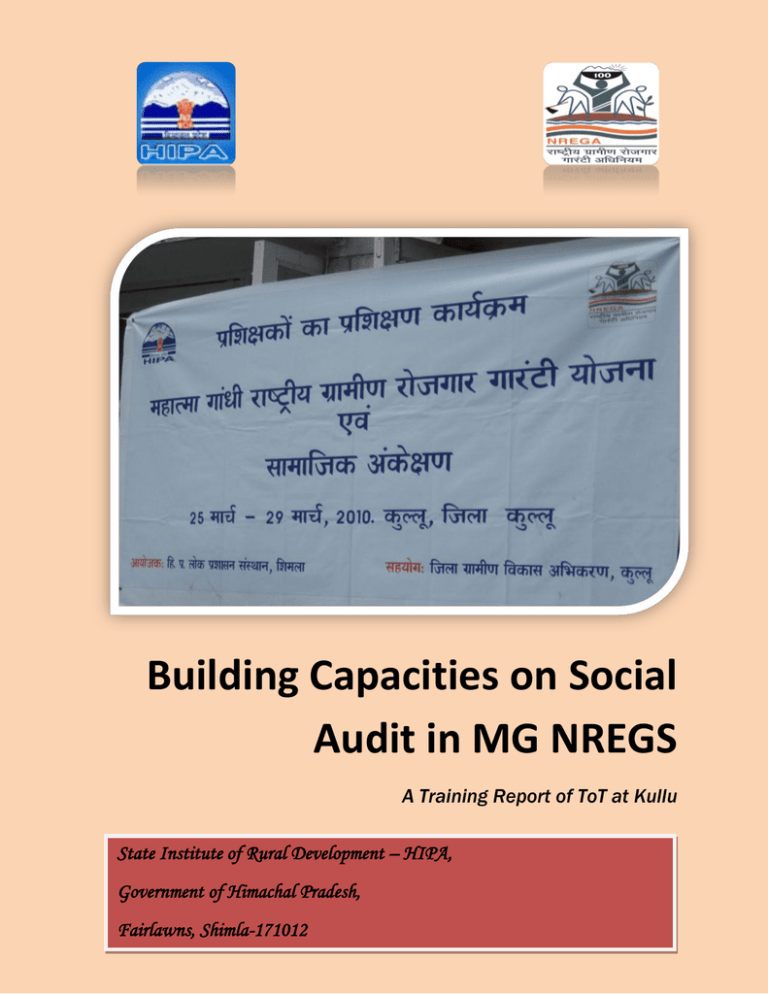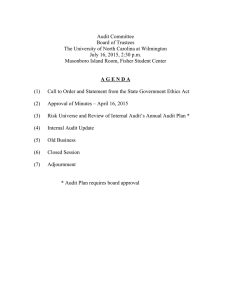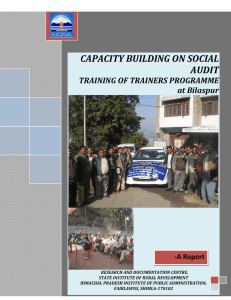Building Capacities on Social Audit in MG NREGS
advertisement

Building Capacities on Social Audit in MG NREGS A Training Report of ToT at Kullu State Institute of Rural Development – HIPA, Government of Himachal Pradesh, Fairlawns, Shimla-171012 Map of Kullu District INDEX Chapter 1 Title Page 4 Imparting Knowledge Through Class Room Training Imparting Skills Through Exposure to Records Imparting Skills Through Transfer of Knowledge & Skills Social Audit Report 5 Recommendation 56-59 Annexure 60-83 2 3 1-17 18-46 47-51 52-55 FOREWORD Development and growth require constant innovation and capacity building. It is important that processes, procedures and instructions are widely disseminated and officials and non-officials are equipped and updated in this regard by providing quality training. Training which is a model of knowledge, skills and attitudinal change leads to overall capacity development. Training at the lower levels with appropriate solution to field level difficulties helps in implementation of developmental programmes. MGNREGA is a unique scheme on the globe which provides statutory guarantee of unskilled job on demand for the livelihood security to any adult member of a rural household in India. The scheme is being implemented in the country as a flagship programme of Ministry of Rural Development, Government of India in a very transparent manner where the onus of carrying out the social audit has been bestowed upon the local community. MGNREGS is the only scheme where social audit has been mandated with constitutional provision. Social Audit takes places in a right spirit has been included in the 100 days agenda of the Government of India. It is being monitored through a project monitoring software at the national level. It has been observed over the time that social audit is not taking place in true spirit in the absence of proper procedure and the capacity to undertake it. Over the time, it has also been felt that social audit, a statutory provision in the act has not been taking place due to capacity gaps at the grass root levels. Apropos of it, SIRD has initiated this process of organizing ToT’s in a decentralized manner with practical orientation by moving to one particular panchayat, auditing the panchayat documents, records, muster rolls and works executed etc. and thereafter presenting the findings in the Gram Sabha. State Institute of Rural Development, HIPA has been organizing Training of Trainers programme on Social Audit in MNREGA at district level since 2007. This training of Training Programme is an ideal combination of knowledge and skills, finally leading to attitudinal change in the effective implementation of the programme. It is expected that the pool of trainers on social audit created through this ToT programme will be a useful asset with DRDA and blocks in district Kullu to undertake social audit in future. I am happy to know that State Institute of Rural Development, HP has undertaken this programme as an action oriented research. I would also like to place on record that effort put in by Sh. Rajeev Bansal, Research Officer in writing this report with the support provided by Ms. Aasiya Rehman, YP CAPART, under overall direction & guidance of Sh. S. C. Sharma, Deputy Director (Research) SIRD, HP. The aim of this report is to use it as a reference report for disseminating the process and practices. Proper documentation of these practices will go a long way in improving the implementation of the programme. I hope this report will be useful for experts, innovators, decision makers and all other involved in public policy. Place:Fairlawns Dated: July, 2010 Dr. Shrikant Baldi, IAS, DIRECTOR HP Institute of Public Administration




